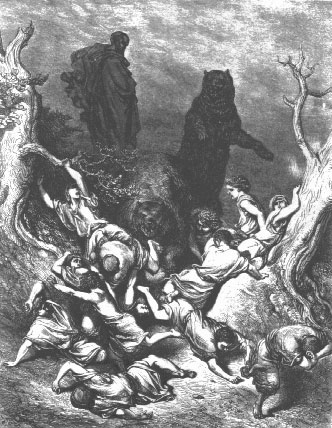Apr
9
2009
And the LORD said, “Arise, anoint him, for this is he.” Then Samuel took the horn of oil and anointed him in the midst of his brothers. And the Spirit of the LORD rushed upon David from that day forward. And Samuel rose up and went to Ramah.
Now the Spirit of the LORD departed from Saul, and a harmful spirit from the LORD tormented him. And Saul’s servants said to him, “Behold now, a harmful spirit from God is tormenting you. Let our lord now command your servants who are before you to seek out a man who is skillful in playing the lyre, and when the harmful spirit from God is upon you, he will play it, and you will be well.” (1 Sam. 16:12-16)
Does God send evil spirits? …
Continue reading
Comments Off | tags: Babylon, Covenant curse, David, Herod, Jeff Meyers, Pharaoh, Satan, Saul, Temple | posted in Biblical Theology
Apr
8
2009

God calls His people to represent Him to others who don’t know Him. When, through unbelief, these mediators forget that God is in charge, not them, they become ‘squatters’ in God’s house. They act like they own the place and mistreat God’s true children.
Continue reading
Comments Off | tags: Ahab, Apostasy, Babylon, Jezebel | posted in Biblical Theology
Apr
8
2009
“…and I came to Jerusalem and discovered the evil that Eliashib had done for Tobiah, in preparing a room for him in the courts of the house of God. And it grieved me bitterly; therefore I threw all the household goods of Tobiah out of the room. Then I commanded them to cleanse the rooms; and I brought back into them the articles of the house of God, with the grain offering and the frankincense.” Nehemiah 13:7-9
After the failure of Israel’s kings and their adulterous priesthood, God established new worship in the “wilderness” of Babylon under Daniel and Ezekiel. When Babylon fell, He brought His new Jerusalem, like a pure bride, back to the mountain of God.
Continue reading
Comments Off | tags: Apostasy, Compromise, Daniel, Ezekiel, Ezra, Man of sin, Nehemiah, Priesthood | posted in The Restoration Era
Apr
8
2009

The Friday night before my nineteenth birthday Mrs. Finucane sends me for the sherry. When I return she is dead in the chair, her eyes wide open, and her purse on the floor wide open. I can’t look at her but I help myself to a roll of money. I take the key to the trunk upstairs. I take forty of the hundred pounds in the trunk and the ledger. I’ll add this to what I have in the post office and I have enough to go to America. On my way out I take the sherry bottle to save it from being wasted.
I sit by the River Shannon near the dry docks sipping Mrs. Finucane’s sherry. Aunt Aggie’s name is in the ledger. She owes nine pounds. It might have been the money she spent on my clothes a long time ago but now she’ll never have to pay it because I heave the ledger into the river. I’m sorry I wrote threatening letters to the poor people in the lanes of Lamerick, my own people, but the ledger is gone, no one will ever know what they owe and they won’t have to pay their balances.
From Angela’s Ashes by Frank McCourt
“As far as the east is from the west, so far hath he removed
our transgressions from us.” Psalm 103:12
Comments Off | tags: Biography, Justification | posted in Quotes
Apr
8
2009
In Hebrew, vindication and redemption are one word. When Job was confident that his redeemer lived, he was looking forward to his vindication against his “comforters.”
Jesus’ words against the Temple hung over Jerusalem for a generation, and would be vindicated despite Herod’s obsessive glorification of his graven image. Its completion in AD64 was taken as proof that Jesus was indeed a false prophet.
Christ came in judgment as He promised and the Temple was destroyed. Vindication and redemption came in one event, and new worship would be born through the death of the old.
“The pagan view of law is that justice is a balancing of the scales. The biblical view of law is that justice is transformational.”1
The death and resurrection of Israel in Christ as the head would be measured out in the people of God as the body. God’s Word brings division that leads totransfiguration. His justice always has one eye on the future.
1 James B. Jordan, Preterism vs. Gnosticism [lecture]. Available from www.wordmp3.com
Comments Off | tags: James Jordan, Job, Justice, Temple, Vindication | posted in Biblical Theology, Ethics
Apr
8
2009
A sample of the new ESV Study Bible was recently made available.
I liked this observation in the notes:
“Jonah’s rescue from death provides an analogy for the resurrection of Christ… The repentance of the Ninevites anticipates the wide-scale repentance of Gentiles in the messianic era.”
But not this one: “Humor, as Jonah’s behavior is not only ignominious but also ridiculous.”
When the prophets (like Elijah, Elisha and Jonah) were sent to Gentiles, it was to provoke Israel to jealousy because they would not listen to these prophets. Jonah understood his ministry meant condemnation would come upon his own people:
James B. Jordan said,
“I don’t think Jonah was some loyal nationalistic prophet. Jonah was in there every day complaining, criticising, prophesying, and denouncing the kingdom of northern Israel. It won’t do to say that Jonah didn’t want to take the Gospel to another nation. No, Jonah has something more profound in mind. Jonah was thinking about Deuteronomy 32:21. He didn’t want to take the Gospel to the Gentiles, because to do so was to bring about a curse on the Israelites. ”1
Paul was a more faithful Jonah, understanding this curse but obeying it nonetheless (Romans 9:3; Acts 28:28)
The study Bible looks good though.
1 Lectures on Jonah, available from www.wordmp3.com
[Originally posted 21 August 08]
Comments Off | tags: ESV, James Jordan, Jonah, Paul, Resurrection | posted in Biblical Theology
Apr
8
2009
“Typology is a philosophy of history.
It is also a theory of meaning.
Typology is a historical theory of meaning, a theory of historical meaning.
That Matthew can say “Out of Egypt I called My Son” is fulfilled in Jesus isn’t evidence that Matthew was a midrashist. It’s not merely a hint about how to read the Old Testament. It’s a pointer to the character of history and the nature of meaning. Texts mean the way Matthew says Hosea’s text means; history’s contours are the contours that Matthew discerns in Hosea’s reference to the exodus.
Typology is the beginning of wisdom.”
–Peter J. Leithart, www.leithart.com
Comments Off | tags: Peter Leithart, Typology | posted in Biblical Theology, Quotes
Apr
8
2009
 “We so often lead lives forgetful of the fact that our God is very shocking. Amidst all our fragile piety and devouring busyness, we have a Lord who steps in and commands us such things as, “Thou shalt bestow that money for whatsoever thy soul lusteth after, for oxen, or for sheep, or for wine, or for strong drink, or for whatsoever they soul desireth: and thou shalt eat there before the Lord thy God, and thou shalt rejoice, thou and thine household” (Deut. 14:26). Such unthriftiness. Such waste. Such gluttony. Such winebibbing. Such is a command of our holy God.
“We so often lead lives forgetful of the fact that our God is very shocking. Amidst all our fragile piety and devouring busyness, we have a Lord who steps in and commands us such things as, “Thou shalt bestow that money for whatsoever thy soul lusteth after, for oxen, or for sheep, or for wine, or for strong drink, or for whatsoever they soul desireth: and thou shalt eat there before the Lord thy God, and thou shalt rejoice, thou and thine household” (Deut. 14:26). Such unthriftiness. Such waste. Such gluttony. Such winebibbing. Such is a command of our holy God.
For some reason foreign to our modern ears, God tells us that celebration is central to pleasing Him; it is central to leading a good life. Modern American life has no time for serious celebrations as did life in centuries past. We’ve got work to do; projects and deadlines press us. And yet for all our industrial-strength pragmatism, few if any truly important things get accomplished. We have forgotten that celebration isn’t just an option; it’s a call to full Christian living.
Celebration is worshipping God with our bodies, with the material creation He has set up around us. Celebrating–whether in feasts, ceremonies, holidays, formal worship, or lovemaking–are all part of obeying God’s command to “love the Lord thy God with all thine heart”… God’s redemption and creation ought to keep us in a perpetual state of thanks which bursts out in celebration at every opportunity.”
- Douglas Jones, Douglas Wilson, Angels In The Architecture, p. 80.
Comments Off | tags: Devotion, Doug Jones, Doug Wilson | posted in Ethics
Apr
8
2009

Here is a comment I posted on another blog. The blog accuses God (and the Bible) of cruelty as a basis to reject the Scriptures:
And he [Elisha] went up from thence unto Bethel: and as he was going up by the way, there came forth little children out of the city, and mocked him, and said unto him, Go up, thou bald head; go up, thou bald head. And he turned back, and looked on them, and cursed them in the name of the LORD. And there came forth two she bears out of the wood, and tare forty and two children of them. 2 Kings 2:23-24
Continue reading
Comments Off | tags: AD70, Creation Week, Elijah, Elisha, Joshua, Moses, Remnant | posted in Apologetics, Bible Matrix, Biblical Theology, The Last Days
Apr
8
2009
Adam Smith was a true son of Adam when he wrote these famous words in Chapter 2 of The Wealth of Nations (1776).
But man has almost constant occasion for the help of his brethren, and it is in vain for him to expect it from their benevolence only. He will be more likely to prevail if he can interest their self-love in his favour, and show them that it is for their own advantage to do for him what he requires of them. Whoever offers to another a bargain of any kind, proposes to do this. Give me that which I want, and you shall have this which you want, is the meaning of every such offer; and it is in this manner that we obtain from one another the far greater part of those good offices which we stand in need of. It is not from the benevolence of the butcher, the brewer, or the baker that we expect our dinner, but from their regard to their own interest. We address ourselves, not to their humanity but to their self-love, and never talk to them of our own necessities but of their advantages.
The motivation here is clear: “More for me in history.”
Continue reading
Comments Off | tags: Dominion Theology, Economics, Gary North, Grace | posted in Ethics





























